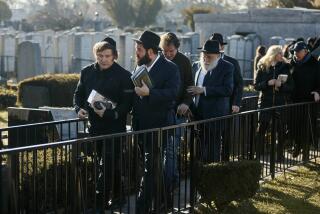Moishe Rosen dies at 78; founder of Jews for Jesus
- Share via
Moishe Rosen, a flamboyant and controversial convert to Christianity who founded the missionary group Jews for Jesus, died Wednesday in San Francisco. He was 78.
The cause was prostate cancer, the group announced.
Rosen launched Jews for Jesus in San Francisco in 1973 and over the next decade turned it into a flourishing movement that drew thousands of converts from among the youthful seekers of the counterculture era. Its success stirred the wrath of Jewish leaders, who denounced Rosen as a cultist and fought back through groups such as Jews for Judaism.
Evangelical leaders such as Vernon Grounds, president emeritus of Denver Conservative Baptist Seminary, praised his dynamism while noting his provocative style.
“When Moishe Rosen came into a city,” Grounds said, “there was either a revival or a riot.”
Rosen appealed to potential converts with music, humor and street theater, an approach that resonated in the hippie culture that by the early 1970s was developing a strong spiritual component, with some youths turning to Eastern religions and others, like those in the “Jesus people” movement, to forms of Christianity. Rosen saw himself as a kind of hybrid who did not regard a Jew who believed in Jesus as a contradiction.
“I never made the decision that I wanted to leave the Jewish community,” he told New York magazine in 1986. “We want to stay in and dissent — and we’ve been ostracized. We wouldn’t separate the two religions. We want a climate where all ideas can be accepted or rejected without previous indoctrination.”
Born in Kansas City, Mo., on April 12, 1932, Rosen grew up in Denver in an Orthodox Jewish family. He was an undergraduate at the University of Colorado in the late 1940s when he met a young Jewish woman named Ceil Starr. In 1953, three years after they were married in an Orthodox synagogue, she met an evangelical Christian and converted. Rosen soon followed her into the faith.
He gave up his job as a camera salesman to enroll at Northeastern Bible College in New Jersey and in 1957 was ordained as a Baptist minister. He worked for the American Board of Missions to the Jews for the next 15 years, 10 of which he spent in Los Angeles as minster for several Hebrew-Christian fellowships. In 1967, he moved to New York to direct recruitment and training for the missionary board.
Intrigued by the hippie movement, he returned to California in 1970 and moved to San Francisco, where he began ministering to Jews with the message that they could believe in Jesus without giving up Jewish culture. He was particularly impressed by the anti- Vietnam War activists, whose communication skills he adopted.
“All you needed was a guy with a mimeograph machine at 8 a.m., and you could get 5,000 people to People’s Park by the afternoon. They were expert grass-roots motivators,” Rosen recalled in a 1996 interview with the San Francisco Chronicle.
He began mass-producing pamphlets that he called “broadsides.” They were handwritten and given wry titles, such as “Jesus Made Me Kosher” and “If Being Born Hasn’t Given You Satisfaction, Try Being Born Again.”
By the mid-1980s, the Jews for Jesus organization was passing out more than two million of the tracts each year, supported by a full-time staff of 100 and an annual budget exceeding $5 million. Jews for Jesus followers could be found attending evangelical churches as well as synagogues, including Messianic Jewish congregations that blended Jewish and Christian rituals.
By the time Rosen retired as executive director in 1996, it had grown into a sophisticated organization with a $13-million budget and seven overseas branches. He remained active on the board of the group and wrote about his beliefs online.
In addition to his wife, he is survived by two daughters, a brother and two grandchildren.
Mainstream Jewish leaders never let up on their criticism, arguing that a Jew for Jesus was as impossible as kosher pork. But Rosen insisted otherwise.
“You can take from me everything but my Jewishness and my belief in God,” he said. “You can say I’m a nuisance, a Christian, out of step with the Jewish community, but you can’t say I’m not a Jew.”
More to Read
Start your day right
Sign up for Essential California for the L.A. Times biggest news, features and recommendations in your inbox six days a week.
You may occasionally receive promotional content from the Los Angeles Times.







